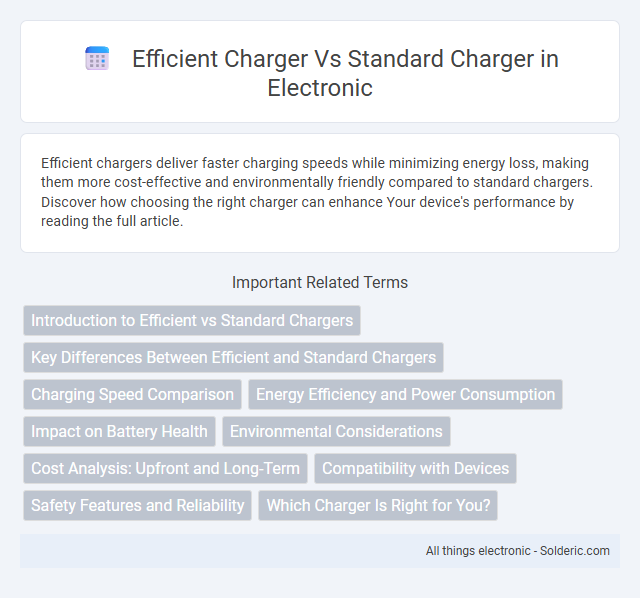Efficient chargers deliver faster charging speeds while minimizing energy loss, making them more cost-effective and environmentally friendly compared to standard chargers. Discover how choosing the right charger can enhance Your device's performance by reading the full article.
Comparison Table
| Feature | Efficient Charger | Standard Charger |
|---|---|---|
| Charging Speed | Fast charging (up to 80% in 30 minutes) | Slower charging (full charge in 2-3 hours) |
| Energy Consumption | Lower energy usage, optimized power delivery | Higher energy waste, less optimized |
| Heat Generation | Minimal heat, better thermal management | More heat produced, riskier for battery health |
| Compatibility | Supports multiple devices and fast charge standards (USB Power Delivery, Quick Charge) | Basic compatibility, limited fast charge support |
| Lifespan | Longer lifespan due to efficient components | Shorter lifespan, prone to wear and tear |
| Cost | Higher upfront cost | Lower upfront cost |
| Portability | Compact, lightweight design | Bulkier, heavier |
Introduction to Efficient vs Standard Chargers
Efficient chargers deliver faster charging speeds and reduce energy waste by utilizing advanced technology such as adaptive power delivery and intelligent heat management. Standard chargers operate at fixed power levels, often resulting in slower charge times and higher energy consumption. Choosing an efficient charger can significantly improve your device's charging performance and energy efficiency.
Key Differences Between Efficient and Standard Chargers
Efficient chargers deliver higher power conversion rates, reducing energy loss and charging your device faster compared to standard chargers that operate with lower efficiency. They incorporate advanced technologies such as GaN (Gallium Nitride) components and smart power management to optimize charging speed and minimize heat generation. Choosing an efficient charger enhances battery longevity and decreases electricity consumption, making it a cost-effective and environmentally friendly option.
Charging Speed Comparison
An efficient charger significantly reduces your device's charging time by delivering optimized power output tailored to the battery's capacity, often supporting fast-charging technologies such as Quick Charge or USB Power Delivery. Standard chargers provide a fixed, lower wattage output that results in slower charging speeds, typically around 5W to 10W, compared to efficient chargers that can exceed 18W or more. Choosing an efficient charger ensures quicker battery replenishment, minimizing downtime and enhancing overall device usability.
Energy Efficiency and Power Consumption
Efficient chargers are designed with advanced technologies such as GaN (Gallium Nitride) semiconductors, which significantly reduce power loss and improve energy conversion rates up to 90-95%, compared to standard chargers that often operate at 70-80% efficiency. This increased efficiency results in lower power consumption during both active charging and standby modes, reducing overall electricity usage and heat generation. Consequently, efficient chargers not only promote faster charging times but also contribute to energy savings and environmental sustainability over the device's lifespan.
Impact on Battery Health
Efficient chargers use advanced technology to regulate voltage and current more precisely, reducing heat generation and minimizing stress on your battery cells. Standard chargers often deliver inconsistent power levels, leading to faster battery degradation and reduced lifespan. Choosing an efficient charger helps maintain optimal battery health, ensuring longer device usability and better overall performance.
Environmental Considerations
Efficient chargers significantly reduce energy consumption by minimizing power loss during charging, directly lowering your carbon footprint compared to standard chargers. Their advanced technology ensures less heat generation and improved energy transfer, which decreases overall electricity demand and environmental impact. Choosing an efficient charger supports sustainable energy use and promotes greener charging practices.
Cost Analysis: Upfront and Long-Term
Efficient chargers typically have a higher upfront cost compared to standard chargers but offer significant long-term savings through reduced energy consumption and lower electricity bills. Standard chargers may be cheaper initially but often lead to increased operational costs over time due to inefficiency and higher power usage. Evaluating your charging needs with a focus on total cost of ownership can optimize your investment and energy expenditure.
Compatibility with Devices
Efficient chargers are designed with advanced technology to support a wider range of devices, including smartphones, tablets, laptops, and smartwatches, ensuring faster and safer charging. They often feature universal compatibility with various voltage and current standards, adapting automatically to your device's specific power requirements. Standard chargers may charge certain devices effectively but lack the versatility and optimization that efficient chargers provide for all your electronic needs.
Safety Features and Reliability
Efficient chargers incorporate advanced safety features such as over-voltage protection, temperature control, and short-circuit prevention to ensure reliable and safe operation under various conditions. Standard chargers often lack these sophisticated protections, increasing the risk of overheating, damage, or failure during extended use. High reliability in efficient chargers contributes to prolonged device lifespan and consistent performance, making them a safer choice for both users and electronic devices.
Which Charger Is Right for You?
Efficient chargers use advanced technology to deliver faster charging speeds and reduce energy loss, making them ideal for those who need quick power-ups and want to save on electricity costs. Standard chargers provide slower, more consistent charging, which can be beneficial if you prefer a safer, less heat-intensive option for daily use. Your choice depends on whether you prioritize charging speed and energy efficiency or steady, reliable power delivery.
Efficient charger vs Standard charger Infographic

 solderic.com
solderic.com